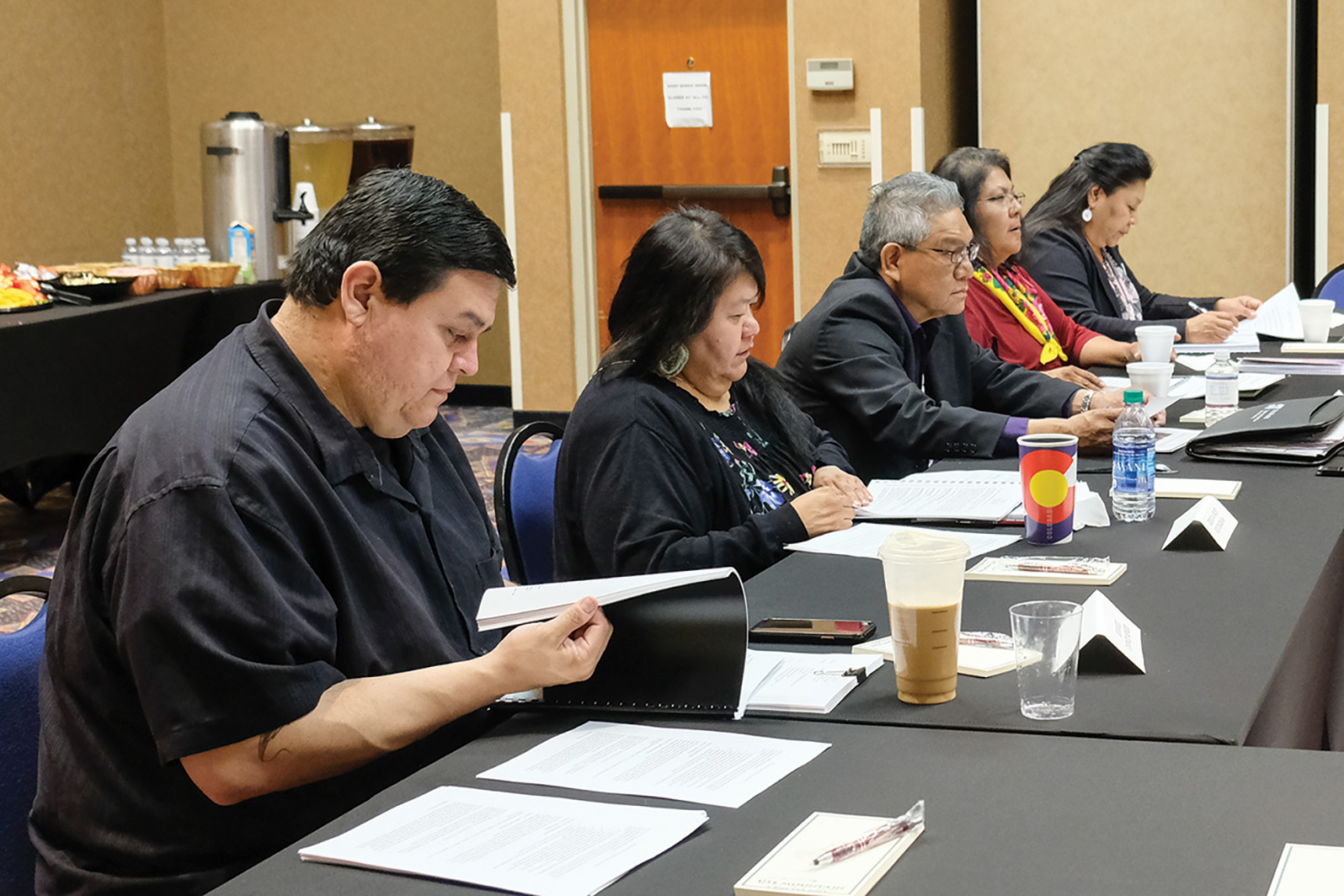Although there was no quorum to conduct an official meeting, the Tri-Ute Council still met for an informational meeting in Towaoc, Colo. in the Ute Mountain Casino, Thursday, May 30. Members of the Southern Ute and Ute Mountain Ute Tribal Council were in attendance; however Northern Ute’s Tribal Council were not at the quarterly meeting.
Ute Mountain Ute Chairman, Harold Cuthair welcomed those in attendance, and welcoming all to enjoy the Ute Mountain Ute Bear Dance that was to take place the weekend from, May 31 through June 3.
A unified Ute tribe
Southern Ute Councilman, Adam Red encouraged the three Ute tribes to submit a joint-letter for approval to raise the three Ute flags at the University of Denver, along with the Cheyenne-Arapaho flags. “I feel we will have a better chance of approval if we show unification,” stated Red.
A request was made by the Ute Mountain Ute Tribe to rename Mt. Evans. The 14,265 ft mountain sits east of Denver, in Clear Creek County. The Denver Parks and Recreation (DPR) Departments supports a name change, although a previous request to change the name was made by a Denver school teacher, DPR informed the Ute Mountain Ute Tribe in a letter from Dody Erickson, contact had been made with the Colorado Commission of Indian Affairs and expressed the process should not be a decision made by (DPR) but by the Native American tribes in the area.
A suggestion was brought forth that letters should come from the three Ute Tribes in support of the renaming of Mt. Evans. Michela Alire, with Ute Mountain Ute Environmental Programs, will be contacted on spelling and the letters of support from the Ute tribes, and support from the Lt. Governor Primavera will be submitted to the U.S. Board on Geographic Names.
Reintroduction of the wolf into Colorado
Denny Behrens, Co-Chair of Colorado Stop the Wolf Coalition, presented a 48-slide PowerPoint about the Colorado Stop the Wolf Coalition, an organization, “alerting the public about the harmful consequences of forced introduction of wolves in Colorado,” as stated on their coalition’s website, stopthewolf.org.
Data was presented about the migration of a wolf, declining numbers of game in Yellowstone after the introduction of wolves to the area, and Hydatid disease, a disease known to be transmitted through wolf fecal matter – with fatal effects on wildlife, livestock, pets and humans. The presentation also outlined migration patterns and the potential range area that could encompass the Routt, Grand Mesa, Uncompahgre and San Juan National Forests within ten years of reintroducing the 250 wolves proposed by the Rocky Mountain Wolf Project on the Western Slope of Colorado. Two ballot initiatives to reintroduce wolves may be on the 2020 ballot for approval by voters.
“Have any consultations been made with Tribes in the reintroduction areas, and what impact does this have on the Brunot hunting area?” asked UMU Chairman House. “Where can our voice be heard.”
“Decisions are being made by individuals who do not live here,” stated Councilman Red.
Southern Ute tribal member, Lance Taylor, a member of the Southern Ute Wildlife Advisory Board stated the Southern Ute Wildlife Board is weighing both sides of the reintroduction of the wolf. “There is a greater risk to our livestock, our way of life, our moose and sheep herds in the Brunot area will be affected,” said Taylor.
“In a matter of ten years our [Southern Ute Tribe] hunting tags will decline, we will bring this to Tribal Council,” reiterated Taylor.
Southern Ute Vice-Chairwoman, Cheryl Frost that the Southern Ute Tribal Council and Southern Ute Wildlife will talk on the board’s recommendations, and take the information into consideration. “The Southern Ute Tribal Council is currently neutral on this matter, it’s prudent we see the other side – and make a decision,” stated Frost.
Ute Mountain Ute Councilwoman Prisllena NightStarr offered a few words, “Wolves have become and are part of our culture. This is a serious matter now, now we look at the nature, the impact of the wolf, he migrates for a reason – for food and water.”
NightStarr expressed that management is important, range management. “This is our future, we have to respect and take care of our animals. How do we be there for our people, and our animals, how are we going to be in balance with nature? We need to look at management.”
Preserving the Ute language
Former Ute Mountain Ute Councilwoman Juanita PlentyHoles, now with the Ute Language department gave an update of the Ute Mountain Ute Language program, speaking of the collaboration with the Language Conservatory – recording Ute words mostly from tribal elders – who recorded Ute words for two weeks. The Language Conservatory was awarded a grant to continue to preserve the Ute Language. “My generation, and generations down cannot speak or understand Ute,” PlentyHoles expressed.
Through an A&E Grant, a talking dictionary can be developed, and incorporated within a language curriculum, developing a curriculum for the youth, giving the language back to them. “Our language may die within five generations, unless we pass it on,” said PlentyHoles.
Hemp farming
“The Southern Ute Indian Tribe is open to all aspects of hemp,” stated Red. The Farm Bill of 2014 opened all aspects of hemp production to all North American tribes, without a stipulation linking it to University or Academic programs.
There is only one plant in Colorado that processes hemp and that’s in Montrose, Colo. “We need to partner in some way, on the hemp side, the non-THC product,” said Red. “As hemp makes it’s way into the market, big companies in Colorado will flood the market, such as Coors and Budweiser with infused products.”
“CBD’s, fiber, textiles, manufacturing and processing are all part of what hemp can produce. It’s a natural renewable,” stated Red.
The next Tri-Ute meeting will be in Ft. Duchesne, Utah in September.




